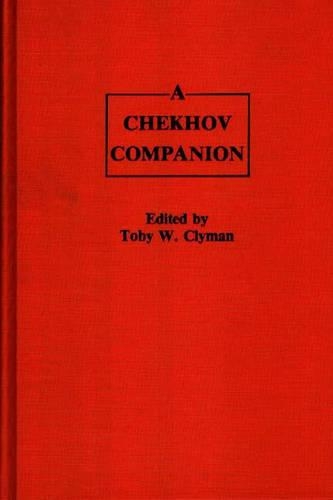
A Chekhov Companion
(Hardback)
Publishing Details
A Chekhov Companion
By (Author) Toby W. Clyman
Bloomsbury Publishing PLC
Greenwood Press
23rd December 1985
United States
Classifications
Tertiary Education
Non Fiction
Literary studies: c 1800 to c 1900
891.723
Physical Properties
Hardback
347
Description
Product information not available.
Reviews
Probably no other Russian writer has been as widely translated in English as Chekhov.' writes one contributor to this aptly titled collection of essays. Indeed, no study of the short story of dramaturgy would be complete without Chekhov, and while his popularity abroad speaks of his universality, Chekhov remains very much a Russian writer. The great value of this book lies precisely in the fact that it provides the background and critical information necessary for more than a superficial knowledge of Chekhov's art'. The study is divided into eight sections, some of which deal with topics that are peripheral but contribute greatly towards a proper understanding of Chekhov and his art. Part I begins with a historical perspective of Chekhov's Russia. . . . Parts II and III examine Chekhov's themes, characters, and aspects of his craftsmanship; Part IV deals with his contributions to modern theatre and the short story. . . . Part VII contains essays dealing with Chekhov's correspondence and his contribution as a social observer. . . . As interest in Chekhov, and the number of his works in English translation, continue to grow, everyone who studies and admires Chekhov will find this volume a useful aid because Chekhov and his works are examined here in his peculiarly Russian environment. Finally, A Chekhov Companion offers readers a thorough bibliography dedicated to the writer.-Canadian Slavonic Papers
The purpose of these 17 essays, authored by well-known Slavic and drama specialists, is to convey the significance of Chekhov within manageable parameters for readers unable to tackle the considerable body of available Chekhov scholarhips. The material ranges over a wide spectrum of topics. Chekhov is given context through review of his fast-developing society, personal struggles with family, illness, medical and literary career, place within Russia's literary tradition. A section on his fiction draws together his major themes and favorite type of character, stressing his own often whimsical attitude toward the latter. Individual works are not treated extensively. Rather, the authors assess Chekhov's far-reaching influence on the 20th-century short story and drama, particularly the impact on modern stage production as well as the extension of Chekhov works into film. Several articles deal with Chekhov's stylistic innovations, narrative technique, and his own dispassionate point of view, with general application of these literary devices to both plays and stories. In their analysis of critical attitudes toward Chekhov, the authors demonstrate to what extent Russian literature is subject to sociopolitical realities. Chekhov's own world view, as expressed in commentaries and letters, is the subject of additional essays. A discourse on the quality of available English translations and a respectable bibliographical sampling round out the book.-Choice
"Probably no other Russian writer has been as widely translated in English as Chekhov.' writes one contributor to this aptly titled collection of essays. Indeed, no study of the short story of dramaturgy would be complete without Chekhov, and while his popularity abroad speaks of his universality, Chekhov remains very much a Russian writer. The great value of this book lies precisely in the fact that it provides the background and critical information necessary for more than a superficial knowledge of Chekhov's art'. The study is divided into eight sections, some of which deal with topics that are peripheral but contribute greatly towards a proper understanding of Chekhov and his art. Part I begins with a historical perspective of Chekhov's Russia. . . . Parts II and III examine Chekhov's themes, characters, and aspects of his craftsmanship; Part IV deals with his contributions to modern theatre and the short story. . . . Part VII contains essays dealing with Chekhov's correspondence and his contribution as a social observer. . . . As interest in Chekhov, and the number of his works in English translation, continue to grow, everyone who studies and admires Chekhov will find this volume a useful aid because Chekhov and his works are examined here in his peculiarly Russian environment. Finally, A Chekhov Companion offers readers a thorough bibliography dedicated to the writer."-Canadian Slavonic Papers
"The purpose of these 17 essays, authored by well-known Slavic and drama specialists, is to convey the significance of Chekhov within manageable parameters for readers unable to tackle the considerable body of available Chekhov scholarhips. The material ranges over a wide spectrum of topics. Chekhov is given context through review of his fast-developing society, personal struggles with family, illness, medical and literary career, place within Russia's literary tradition. A section on his fiction draws together his major themes and favorite type of character, stressing his own often whimsical attitude toward the latter. Individual works are not treated extensively. Rather, the authors assess Chekhov's far-reaching influence on the 20th-century short story and drama, particularly the impact on modern stage production as well as the extension of Chekhov works into film. Several articles deal with Chekhov's stylistic innovations, narrative technique, and his own dispassionate point of view, with general application of these literary devices to both plays and stories. In their analysis of critical attitudes toward Chekhov, the authors demonstrate to what extent Russian literature is subject to sociopolitical realities. Chekhov's own world view, as expressed in commentaries and letters, is the subject of additional essays. A discourse on the quality of available English translations and a respectable bibliographical sampling round out the book."-Choice
Author Bio
yman /f Toby /i W. /r ed.
